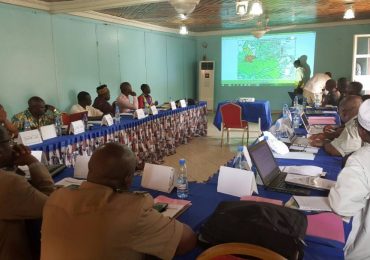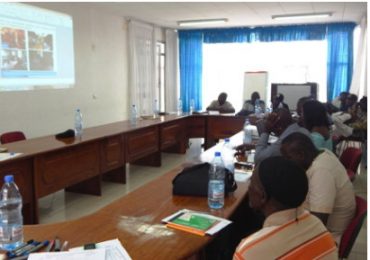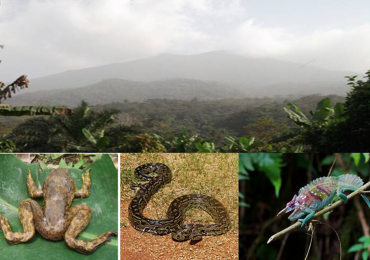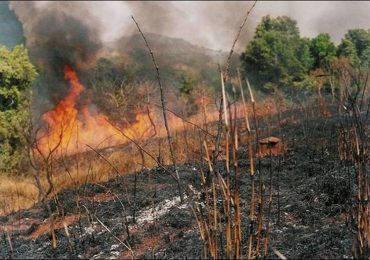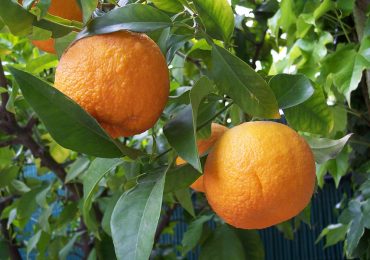Since the ban on non-biodegradable plastics went into effect in April 2014, over 200 persons have been arrested in the Southwest Region and detained for not less than 10 days each for smuggling the contraband into the country. Over 60 tons of plastics less than 61 microns thickness (worth over 300 million CFA) have also been impounded with a case file against some five dealers in court. The arrests have been carried out by the Southwest Regional Delegation of Environment Protection of Nature and Sustainable Development (MNEPEDED) in collaboration with customs officials, the Ministry of Trade and the forces of law and order.
By Ndimuh Bertrand Shancho

The MINEPDED Southwest Regional Delegate, Set Ekwadi Songue, told The Green Vision that over 2 million francs CFA collected as fines have been deposited into the national treasury in Buea.
He explained that the sanction meted out on those caught smuggling banned plastics is in accordance with article 84 of the environmental law, which states that anyone caught commercialising, importing or distributing the banned plastics will spend six months in the cell with a fine of 500,000 francs CFA to 2 million francs CFA.
Set Ekwadi added law no 96/12 of 5th August 2012 laying down conditions for environmental management states that anybody found using substances that are harmful to the environment would be fined between of 5 million to 10 million francs CFA.
“Even those caught using the plastics of 60 microns and below, according to article 370 of Cameroon Penal Code, are liable to a fine of 4000 to 25,000 francs CFA depending on the amount of plastics in their keeping,” said the Delegate.
With the lucrative nature of the plastic business and given that old habits die-hard, the MINEPDED Delegate said each time plastics are seized, he always receives calls from whole sellers.
“The victims always call me afterwards wanting us to negotiate but you know I cannot do that. All of them know me. People who are whole sellers of plastics in Buea know the Delegate and they know I cannot do such a thing. I am sending people to court because of plastics,” Ekwadi told The Green Vision. He, however, admitted that these dealers sometimes succeed in negotiating with other team members and stakeholders.
The Regional Delegate said that with the strategies put in place, there is hope that in the next few years, the use of plastics below 61 microns will be absent in the country.
“I am sure that gradually people will stop using plastic bags. I can say there have been improvements, which makes me really excited. If you go to Muea Market, you will see mothers with Sacks and Motor bags brought from home which is very important and an indication of success in this move,” the Delegate said.
He attributed the success in the ban on non-biodegradable plastics in the Southwest Region to team work and collaboration from other stakeholders.
“We are working with customs officers, and the forces of law and order, the state counsel and other services are helping us a great deal. The forces of law and order and customs officers are there to help us with information and immediately the plastics are seized, they are destroyed and handed over to companies for the production of other products like shoes, buckets, etc,” said Ekwadi.
As to why there is still a good amount of plastics circulating in the market despite the sanctions meted out, the Delegate said the plastics are smuggled from Nigeria and Gabon through Tiko Wharf, Idenau, Movia, Modeka, and Ekok, given that there is no company in Cameroon that is manufacturing plastics below 61 microns. He said it is difficult to track down all plastics entering the region through the Tiko Wharf, talk less of the other access areas that have no walls.
“There is no wall around the borders of these areas which makes control very difficult. There is control at the Tiko Wharf but those people are very intelligent. You can see a big bag and think that it is a bag of cement meanwhile plastics are under the bag. Also, you can be going to control during the day but they will smuggle it during night and vice versa,” the Delegate lamented.
He said people are still interested in such plastics because retailers give them to customers free of charge without thinking of the harmful effects of the plastics on the environment and human health.
Harmful Effects of Plastics
According to the Regional Delegate, plastics below 61 microns cannot be recycled so people tend to dispose of them immediately, thereby littering the environment. Some, he said, even dump the plastics in gutters, blocking drainage and sometimes causing floods beside other environmental challenges.
He noted that there has been increasing rate of cancer in the country with plastics being a great contributing factor.
“Plastics are produced with petroleum products and when you put hot food like beans, fufu corn, or puff-puff in them, the easily get contaminated and can bring about cancer,” the Delegate warned.
He said smoke that emanates from burning plastics also causes cancer.
Besides being dangerous to human health, the Delegate said the indiscriminate dumping of such plastics is one of the greatest causes of death amongst animals and fish in the sea.
The Southwest MINEPDED boss recommended the use of plastics above 61 microns since they cannot be easily eaten up by animals, or used for the wrapping of hot food. He said government is encouraging local companies interested in manufacturing plastics to do so if it is within the prescribed version of 61 microns and above.
This is because such plastics can be reused for at least a month before they are disposed of, in which case the effect on the environment will limited.





